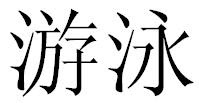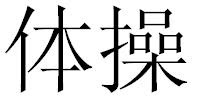
The first character today is 皮, pí meaning skin or leather.
The second character is 划, huá meaning paddle.
The third character is 艇, which means a light boat.
Together 皮划艇, pí huá tǐng means a canoe or kayak.
The fourth character is 静, which means still or calm.
The fifth character is one we have already learnt, it is 水, shuǐ meaning water. We have seen this character in 水球, shuǐ qiú meaning Water polo and also in 跳水, tiào shuǐ which means Diving.
When they are combined 静水, jìng shuǐ literally means still or calm water.
So, the whole phrase means Canoe or kayak in flatwater.
pí is pronounced pee, with a 2nd or rising tone.
huá is pronounced hwah, also with a 2nd or rising tone.
tǐng is pronounced ting with a 3rd, or falling and rising tone.
jìng is pronounced jing, with a 4th or falling tone.
shuǐ is pronounced sh-way, and has the 3rd or falling and rising tone.
The second character is 划, huá meaning paddle.
The third character is 艇, which means a light boat.
Together 皮划艇, pí huá tǐng means a canoe or kayak.
The fourth character is 静, which means still or calm.
The fifth character is one we have already learnt, it is 水, shuǐ meaning water. We have seen this character in 水球, shuǐ qiú meaning Water polo and also in 跳水, tiào shuǐ which means Diving.
When they are combined 静水, jìng shuǐ literally means still or calm water.
So, the whole phrase means Canoe or kayak in flatwater.
pí is pronounced pee, with a 2nd or rising tone.
huá is pronounced hwah, also with a 2nd or rising tone.
tǐng is pronounced ting with a 3rd, or falling and rising tone.
jìng is pronounced jing, with a 4th or falling tone.
shuǐ is pronounced sh-way, and has the 3rd or falling and rising tone.





























